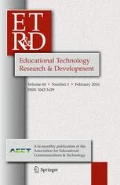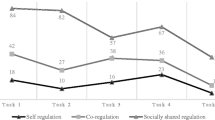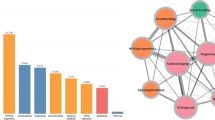Abstract
Combining wiki technology with the literature circles could be powerful and beneficial for promoting the learning of English as a foreign language (EFL). However, little research has been conducted to investigate the role of EFL students’ social forms of regulatory strategies in their learning performance in the context of wiki-supported literature activities. This research explored how students’ social regulation strategies relate to learning engagement and learning outcomes. Ninety-five college EFL students participated in wiki-supported literature circles activities. The results showed that “socially shared regulation” acted as a predictor for students’ engagement, while “co-regulation” acted as a predictor for students’ learning outcomes. The results also highlighted the roles of “monitoring,” “time management,” and “task understanding” in predicting students’ learning performance. In addition, this study also revealed that the students’ social regulation strategies focused more on “planning,” “time management,” and “task understanding”, with few regulatory strategies in “evaluation” and “content monitoring.” The results are discussed, and suggestions for teachers, tool developers and researchers are also proposed.





Similar content being viewed by others
References
Backer, L. D., Keer, H. V., & Valcke, M. (2020). Variations in socially shared metacognitive regulation and their relation with university students’ performance. Metacognition and Learning, 15, 233–259.
Bakeman, R., & Gottman, J. M. (1997). Observing interaction: An introduction to sequential analysis (2nd ed.). Cambridge: Cambridge University Press.
Bikowski, D., & Vithanage, R. (2016). Effects of web-based collaborative writing on individual l2 writing development. Language Learning and Technology, 20(1), 79–99.
Castañeda, D. A., & Cho, M.-H. (2013). The role of wiki writing in learning Spanish grammar. Computer Assisted Language Learning, 26(4), 334–349.
Chang, C. J., Chang, M. H., Chiu, B. C., Liu, C. C., Chiang, S. H. F., Wen, C. T., et al. (2017). An analysis of student collaborative problem solving activities mediated by collaborative simulations. Computers & Education, 114, 222–235.
Chao, Y. C. J., & Lo, H. C. (2011). Students’ perceptions of Wiki-based collaborative writing for learners of English as a foreign language. Interactive Learning Environments, 19(4), 395–411.
Cheng, Y., & Jiang, H. (2015). Instant messenger-based online discourse platform and its impacts on students’ academic performances: An exploratory study in art and design education. Computers & Education, 88, 315–326.
Cho, M.-H., & Lim, S. (2017). Using regulation activities to improve undergraduate collaborative writing on wikis. Innovations in Education and Teaching International, 54(1), 53–61.
Chung, J. M. (1997). A comparison of two multiple-choice test formats for assessing English structure competence. Foreign Language Annals, 30(1), 111–122.
Daniels, H. (2002). Literature circles: Voice and choice in book clubs & reading groups (2nd ed.). New York, ME: Stenhouse.
Daniels, H. (2006). What’s the next big thing with literature circles? Voices from the Middle, 13(4), 10–15.
De Wever, B., Hämäläinen, R., Voet, M., & Gielen, M. (2015). A wiki task for first-year university students: The effect of scripting students’ collaboration. Internet and Higher Education, 25, 37–44.
Ducate, L. C., Anderson, L. L., & Moreno, N. (2011). Wading through the world of wikis: An analysis of three wiki projects. Foreign Language Annals, 44(3), 495–524.
Eeds, M., & Wells, D. (1989). Grand conversations: An exploration of meaning construction in literature study groups. Research in the Teaching of English, 23(1), 4–29.
Elhess, M., & Egbert, J. (2015). Literature circles as support for language development. English Language Forum, 53, 13–21.
Er, E., Dimitriadis, Y., & Gašević, D. (2020). Collaborative peer feedback and learning analytics: Theory-oriented design for supporting class-wide interventions. Assessment & Evaluation in Higher Education. https://doi.org/10.1080/02602938.2020.1764490.
Fransen, J., Weinberger, A., & Kirschner, P. A. (2013). Team effectiveness and team development in CSCL. Educational Psychologist, 48(1), 9–24.
Fredricks, J. A., & McColskey, W. (2012). The measurement of student engagement: A comparative analysis of various methods and student self-report instruments. In S. L. Christenson, A. L. Reschly, & C. Wylie (Eds.), Handbook of research on student engagement (pp. 763–782). New York: Springer.
Furr, M. (2011). Bookworms club reading circles teacher’s handbook (3rd ed.). Oxford, UK: Oxford University Press.
Gettinger, M., & Walter, M. J. (2012). Classroom strategies to enhance academic engaged time. In S. L. Christenson, A. L. Reschly, & C. Wylie (Eds.), Handbook of research on student engagement (pp. 653–673). New York: Springer.
Hadwin, A. F., Järvelä, S., & Miller, M. (2011). Self-regulated, co-regulated, and socially-shared regulation of learning. In B. J. Zimmerman & D. H. Schunk (Eds.), Handbook of self-regulation of learning and performance (pp. 65–84). New York: Routledge.
Hadwin, A., & Oshige, M. (2011). Self-regulation, coregulation, and socially shared regulation: Exploring perspectives of social in self-regulated learning theory. Teachers College Record, 113(2), 240–264.
Hathaway, R. (2011). A powerful pairing: The literature circle and the wiki. The ALAN Review, 38(3), 14–22.
Hsu, H. (2019). Wiki-mediated collaboration and its association with L2 writing development: An exploratory study. Computer Assisted Language Learning, 32(8), 945–967.
Hsu, H. C., & Lo, Y. F. (2018). Using wiki-mediated collaboration to foster L2 writing performance. Language Learning & Technology, 22(3), 103–123.
Janssen, J., Erkens, G., Kirschner, P. A., & Kanselaar, G. (2012). Task-related and social regulation during online collaborative learning. Metacognition and Learning, 7(1), 25–43.
Järvelä, S., & Hadwin, A. F. (2013). New frontiers: Regulating learning in CSCL. Educational Psychologist, 48(1), 25–39.
Järvelä, S., Jävernoja, H., & Malmberg, J. (2019). Capturing the dynamic and cyclical nature of regulation: Methodological progress in understanding socially shared regulation in learning. International Journal of Computer-Supported Collaborative Learning, 14, 425–441.
Järvelä, S., Järvenoja, H., Malmberg, J., & Hadwin, A. F. (2013). Exploring socially shared regulation in the context of collaboration. Journal of Cognitive Education and Psychology, 12(3), 267–286.
Järvelä, S., Järvenoja, H., Malmberg, J., Isohätälä, J., & Sobocinski, M. (2016a). How do types of interaction and phases of self-regulated learning set a stage for collaborative engagement? Learning and Instruction, 43, 39–51.
Järvelä, S., Kirschner, P. A., Hadwin, A., Järvenoja, H., Malmberg, J., Miller, M., et al. (2016b). Socially shared regulation of learning in CSCL: Understanding and prompting individual- and group-level shared regulatory activities. International Journal of Computer-Supported Collaborative Learning, 11(3), 263–280.
Järvelä, S., Malmberg, J., & Koivuniemi, M. (2016c). Recognizing socially shared regulation by using the temporal sequences of online chat and logs in CSCL. Learning & Instruction, 42, 1–11.
Järvelä, S., Volet, S., & Järvenoja, H. (2010). Research on motivation in collaborative learning: Moving beyond the cognitive–situative divide and combining individual and social processes. Educational Psychologist, 45(1), 15–27.
Kennedy, C., & Miceli, T. (2013). In piazza online: Exploring the use of wikis with beginner foreign language learners. Computer Assisted Language Learning, 26(5), 389–411.
Khosa, D. K., & Volet, S. E. (2014). Productive group engagement in cognitive activity and metacognitive regulation during collaborative learning: Can it explain differences in students’ conceptual understanding? Metacognition & Learning, 9(3), 287–307.
Kim, D., & Lim, C. (2018). Promoting socially shared metacognitive regulation in collaborative project-based learning: A framework for the design of structured guidance. Teaching in Higher Education, 23(2), 194–211.
Kim, M., & Kim, S. (2020). Dynamic learner engagement in a wiki-enhanced writing course. Journal of Computing in Higher Education, 32(3), 582–606.
Lajoie, S. P., & Lu, J. (2012). Supporting collaboration with technology: Does shared cognition lead to coregulation in medicine? Metacognition and Learning, 7(1), 45–62.
Larson, L. C. (2009). Reader response meets new literacies: Empowering readers in online learning communities. The Reading Teacher, 62(8), 638–648.
Lee, L., Lajoie, S. P., Poitras, E. G., Nkangu, M., & Doleck, T. (2016). Co-regulation and knowledge construction in an online synchronous problem based learning setting. Education and Information Technologies, 22(4), 1623–1650.
Lee, A., O’Donnell, A. M., & Rogat, T. K. (2015). Exploration of the cognitive regulatory sub-processes employed by groups characterized by socially shared and other-regulation in a CSCL context. Computers in Human Behavior, 52, 617–627.
Li, M., & Zhu, W. (2017). Good or bad collaborative wiki writing: Exploring links between group interactions and writing products. Journal of Second Language Writing, 35, 38–53.
Li, X., & Chu, S. K. W. (2018). Using design-based research methodology to develop a pedagogy for teaching and learning of Chinese writing with wiki among Chinese upper primary school students. Computers & Education, 126, 359–375.
Li, X., Chu, S. K. W., Ki, W. W., & Woo, M. (2012). Using a wiki-based collaborative process writing pedagogy to facilitate collaborative writing among Chinese primary school students. Australasian Journal of Educational Technology, 28(1), 159–181.
Li, X., Chu, S. K. W., & Ki, W. W. (2014). The effects of a wiki-based collaborative process writing pedagogy on writing ability and attitudes among upper primary school students in mainland china. Computers & Education, 77, 151–169.
Li, Y., Li, X., Su, Y., Peng, Y., & Peng, Y. (2020). Exploring the role of EFL learners’ online self-regulation profiles in their social regulation of learning in wiki-supported collaborative reading activities. Journal of Computers in Education, 7(4), 575–595.
Lin, W. C., & Yang, S. C. (2011). Exploring students’ perceptions of integrating wiki technology and peer feedback into English writing courses. English Teaching, 10(2), 88–103.
Long, M. H. (1996). The role of the linguistic environment in second language acquisition. In W. C. Ritchie & T. K. Bhatia (Eds.), Handbook of second language acquisition (pp. 413–468). New York: Academic Press.
Lu, J., & Churchill, D. (2014). The effect of social interaction on learning engagement in a social networking environment. Interactive Learning Environments, 22(4), 401–417.
Ma, Q. (2019). Examining the role of inter-group peer online feedback on wiki writing in an EAP context. Computer Assisted Language Learning, 33(3), 197–216.
Malmberg, J., Järvelä, S., & Järvenoja, H. (2017). Capturing temporal and sequential patterns of self-, co-, and socially shared regulation in the context of collaborative learning. Contemporary Educational Psychology, 49, 160–174.
Macfadyen, L. P., & Dawson, S. (2010). Mining LMS data to develop an “early warning system” for educators: A proof of concept. Computers & Education, 54, 588–599.
McElvain, C. M. (2010). Transactional literature circles and the reading comprehension of English learners in the mainstream classroom. Journal of Research in Reading, 33(2), 178–205.
Miller, M., & Hadwin, A. (2015). Scripting and awareness tools for regulating collaborative learning: Changing the landscape of support in CSCL. Computers in Human Behavior, 52, 573–588.
Moreillon, J., Hunt, J., & Ewing, S. (2009). Learning and teaching in WANDA wiki wonderland: Literature circles in the digital commons. Teacher Librarian, 37(2), 23–28.
Morris, L. V., Finnegan, C., & Wu, S. S. (2005). Tracking student behavior, persistence, and achievement in online courses. The Internet and Higher Education, 8(3), 221–231.
Panadero, E., Jonsson, A., & Botella, J. (2017). Effects of self-assessment on self-regulated learning and self-efficacy: Four meta-analyses. Educational Research Review, 22, 74–98.
Panadero, E., & Alonso-Tapia, J. (2013). Self-assessment: Theoretical and practical connotations. When it happens, how is it acquired and what to do to develop it in our students. Electronic Journal of Research in Educational Psychology, 11(2), 551–576.
Qiu, X., & Lee, M. K. (2020). Regulated learning and self-efficacy beliefs in peer collaborative writing: An exploratory study of L2 learners’ written products, task discussions, and self-reports. System. https://doi.org/10.1016/j.system.2020.102312.
Oller, J. W. (1979). Language tests at school. London: Longman.
Rogat, T. K., & Linnenbrink-Garcia, L. (2011). Socially shared regulation in collaborative groups: An analysis of the interplay between quality of social regulation and group processes. Cognition and Instruction, 29(4), 375–415.
Shelton-Strong, S. J. (2011). Literature circles in ELT. ELT Journal, 66(2), 214–223.
Shelton-Strong, S. J. (2019). An analysis of collaborative dialogue in literature circles. In C. Jones (Ed.), Literature, spoken language and speaking skills in second language learning (pp. 176–201). Cambridge: Cambridge University Press.
Storch, N. (2013). Collaborative writing in L2 classrooms. Bristol, UK: Multilingual Matters.
Su, Y., Li, Y., Hu, H., & Rosé, C. P. (2018). Exploring college English language learners’ self and social regulation of learning during wiki-supported collaborative reading activities. International Journal of Computer-Supported Collaborative Learning, 13(1), 35–60.
Su, Y., Li, Y., Liang, J. C., & Tsai, C. C. (2019). Moving literature circles into wiki-based environment: The role of online self-regulation in EFL learners’ attitude toward collaborative learning. Computer Assisted Language Learning, 32(5–6), 556–586.
Ucan, S. (2017). Changes in primary school students’ use of self and social forms of regulation of learning across collaborative inquiry activities. International Journal of Educational Research, 85, 51–67.
Ucan, S., & Webb, M. (2015). Social regulation of learning during collaborative inquiry learning in science: How does it emerge and what are its functions? International Journal of Science Education, 37(15), 2503–2532.
Vygotsky, L. S. (1978). Mind and society. Cambridge, MA: Harvard University Press.
Volet, S., & Mansfield, C. (2006). Group work at university: Significance of personal goals in the regulation strategies of students with positive and negative appraisals. Higher Education Research & Development, 25(4), 341–356.
Volet, S., Summers, M., & Thurman, J. (2009a). High-level co-regulation in collaborative learning: How does it emerge and how is it sustained? Learning and Instruction, 19(2), 128–143.
Volet, S., Vauras, M., & Salonen, P. (2009b). Self- and social regulation in learning contexts: An integrative perspective. Educational Psychologist, 44(4), 215–226.
Wang, F. H. (2017). An exploration of online behaviour engagement and achievement in flipped classroom supported by learning management system. Computers & Education, 114, 79–91.
Wang, L. (2019). Effects of regulation on interaction pattern in web-based collaborative writing activity. Computer Assisted Language Learning. https://doi.org/10.1080/09588221.2019.1667831.
Wang, Y. C. (2015). Promoting collaborative writing through wikis: A new approach for advancing innovative and active learning in an ESP context. Computer Assisted Language Learning, 28(6), 499–512.
Wei, X., Cheng, I., Chen, N., et al. (2020). Effect of the flipped classroom on the mathematics performance of middle school students. Educational Technology Research and Development, 68, 1461–1484.
Wichmann, A., & Rummel, N. (2013). Improving revision in wiki-based writing: Coordination pays off. Computers & Education, 62, 262–270.
Widodo, H. P. (2016). Engaging students in literature circles: Vocational English reading programs. The Asia-Pacific Education Researcher, 25(2), 347–359.
Woo, M. M., Chu, S. K. W., & Li, X. (2013). Peer-feedback and revision process in a wiki mediated collaborative writing. Educational Technology Research and Development, 61(2), 279–309.
Zhang, Q., Peck, K. L., Hristova, A., et al. (2016). Exploring the communication preferences of MOOC learners and the value of preference-based groups: Is grouping enough? Education Technology Research and Development, 64, 809–837.
Zheng, Y., & Cheng, L. (2008). College English test (CET) in China. Language Testing, 25(3), 408–417.
Zheng, L., & Huang, R. (2016). The effects of sentiments and co-regulation on group performance in computer supported collaborative learning. Internet and Higher Education, 28, 59–67.
Zimmerman, B., & Schunk, D. H. (2011). Self-regulated learning and performance: An introduction and overview. In B. J. Zimmerman & D. H. Schunk (Eds.), Handbook of self-regulation of learning and performance (pp. 1–12). New York: Routledge.
Zorko, V. (2009). Factors affecting the way students collaborate in a wiki for English language learning. Australasian Journal of Educational Technology, 25(5), 645–665.
Acknowledgements
The authors would like to thank the anonymous reviewers for their enlightening comments and suggestions.
Funding
This work was supported by National Natural Science Foundation of China (61877003), Humanities and Social Sciences Fund of Chinese Ministry of Education (18YJC740084), Teaching Reform Project supported by Beijing University of Posts and Telecommunications (2017JY64), and the International Joint Research Project of Faculty of Education, Beijing Normal University.
Author information
Authors and Affiliations
Corresponding author
Ethics declarations
Conflict of interest
The authors declare that they have no conflict of interest.
Additional information
Publisher's Note
Springer Nature remains neutral with regard to jurisdictional claims in published maps and institutional affiliations.
Rights and permissions
About this article
Cite this article
Li, Y., Chen, K., Su, Y. et al. Do social regulation strategies predict learning engagement and learning outcomes? A study of English language learners in wiki-supported literature circles activities. Education Tech Research Dev 69, 917–943 (2021). https://doi.org/10.1007/s11423-020-09934-7
Accepted:
Published:
Issue Date:
DOI: https://doi.org/10.1007/s11423-020-09934-7




